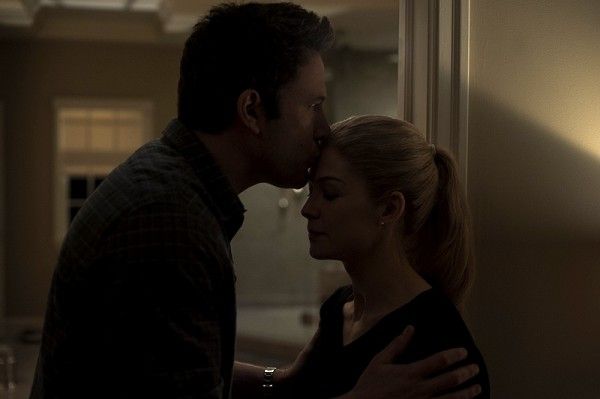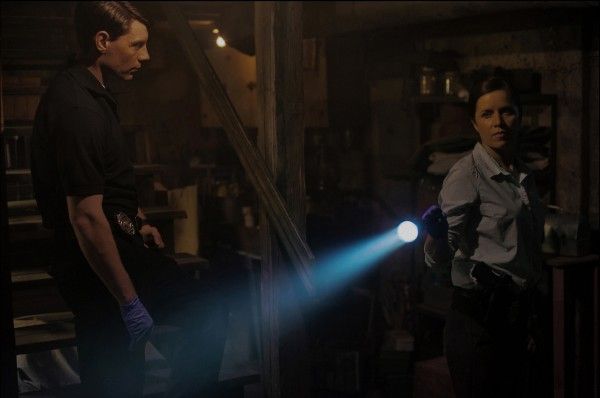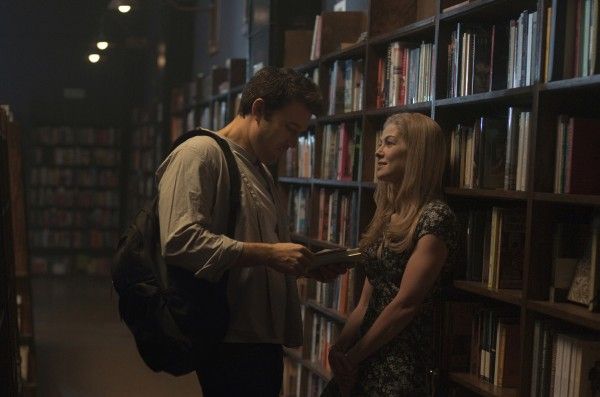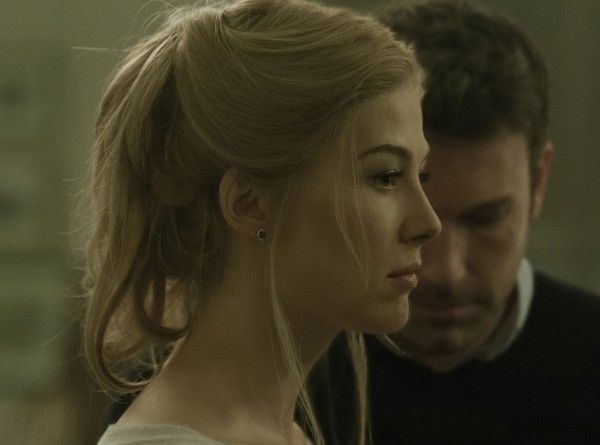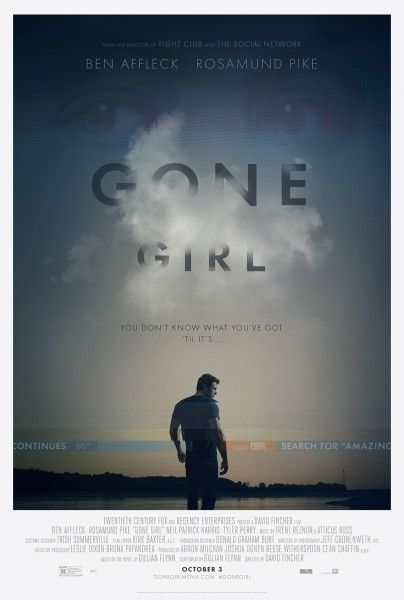There's nothing that makes us as emotionally blind as love. Because we crave is so badly, we're willing to distort reality and distort others so that they meet our needs. And when the veil lifts and the truth is exposed, everything breaks apart. Our emotions can surpass hate. At least hate is outright rejection. David Fincher's Gone Girl is a vicious, nasty, and bitingly funny look at anti-love. It's a dark, twisted, borderline celebration of how deluded people can be in what they demand of others be it morally, emotionally, or truthfully. Perhaps Fincher's most cold, pitiless, and acerbic movie to date, Gone Girl is not without its flaws, but even those flaws serve this bitter, captivating, knives-out picture of marriage as a violent crime.
Nick Dunne (Ben Affleck) comes home to find his wife Amy (Rosamund Pike) has disappeared. During the investigation, detectives Boney (Kim Dickens) and Gilpin (Patrick Fugit) begin to suspect Nick is responsible for Amy's murder despite the lack of a body, and Nick certainly has his fair share of secrets, so he's eager to avoid the blame. As Amy's disappearance stretches on, Nick becomes the target of a media witch hunt, and the only way to clear his name is to discover the truth about his wife. But the truth is far deeper than a missing persons case. It's the truth about love and marriage.
Fox has admirably avoided revealing the twists and turns of the story, so I will respect their secrecy (especially since so many studios spoil their movies) and do my best to talk around any major reveals. However, if you fear you'll be able to deduce what happens from my comments, I suggest you stop reading. Again, I won't mention any plot points directly, but at the same time, I still want to provide my thoughts on the movie to the best of my ability.
The studio has sold the film as an investigative thriller, and that's certainly part of the movie. The investigation is fast-paced, Boney is a sharp, highly competent detective (Gilpin's job is apparently to stand back and just dislike Nick), and she does a good job of working the case, or at least where a reasonable detective would think to go. Nothing is as it appears in Gone Girl, and that deception extends to every thread without Fincher really playing "Gotcha!", although having read the book, perhaps some of the twists were lost on me. At the very least, don't expect something played at the level of the Fight Club reveal.
The truth is fine, but Fincher and Gillian Flynn (who adapted the screenplay from her novel) are far more interested in lies in all walks of life. The director gleefully dissects marriage, but also provides a brutal characterization of the media. An alternate title for the film could easily be Nancy Grace Is a Despicable Clown as talk show host Ellen Abbott has actress Missi Pyle doing her best impression of the dead-eyed, faux-infuriated media personality. Abbott represents the news media and how it feeds into the distortions people want about Nick. People demand idyllic marriages, so Nick must have killed his wife therefore ruining all innocence, and therefore we must demand he be publicly tried and executed. The truth isn't what matters. It's what we want the truth to be.
For all of the media criticism and methodology of the investigation, Gone Girl is mostly about marriage, and it makes War of the Roses look like a minor spat. This isn't war; it's nuclear annihilation. Our desire is to pick side. We want to be for the mob and make the case as easy as possible: Nick is the monster and Amy is the helpless victim. Their marriage isn't meant to stand in for all marriages, but it's one that's far more complicated than we'd like to believe.
It's nice to imagine Amy as perfect and innocent, which is actually quite misogynistic because we'd prefer to accept this one-dimensional image of the ideal wife. But what if Amy were more complicated? There are two sides to every story and both sides in Gone Girl are deeply, unrelentingly ugly. Pike gives a very strong performance, but Amy is more powerful as an idea than a character. It's easier to buy Nick as a regular guy. He's handsome, but not dauntingly so. Affleck put on a little weight for the role, and given the actor's personal history, Nick being hounded by the media looks like a flashback to the early 2000s. That's not to say one side is more empathetic than the other. It's to say that no one gets away clean because both sides are dirty.
This is arguably Fincher's ugliest, most brutal film, and he made Se7en, a story where a happy marriage ends because the wife is decapitated by a serial killer. Sure, John Doe is a monster, but that's the thing: he's a monster. He's an exaggerated creature. He doesn't really live in our world. Gone Girl hits close to home because it's in the home. Fincher is not only merciless in his depiction of this horrific marriage; he's smirking at its grotesque transformation. In an interview with The Hollywood Reporter in 2011, Fincher said "I don't buy this notion that emotion and sentimentality are the same," adding, "It's not a colder point of view; that's reductive. It's more adult."
The precise, creeping camera and faded color palette belie "a colder point of view", but the film's heart races with a disturbing and irreverent tone. Trent Reznor and Atticus Ross' score mocks the playful, romantic melody by providing bitter undertones surfacing throughout. Amy's former boyfriend Desi (Neil Patrick Harris) lurks about, and Harris does so much despite having a rushed amount of screen time. Nick's sister Margo (Carrie Coon) always has a wry, cutting comment at the ready. Gone Girl can be surprisingly funny, but it's always gallows humor, which is fitting for the way death hangs around the movie's sick notion of how love functions.
Gone Girl opens with Nick stroking Amy's hair, and we hear his thoughts. His narration begins with a sweet sentiment, "What are you think?" followed by the thought of wanting to bash out her brains so he could see her thoughts spool out. This feeling pervades the entire movie: the desire for love, but with Amy, there's something disturbingly enigmatic. You won't like what you find because the truth doesn't just hurt. It eviscerates.
Rating: B+


